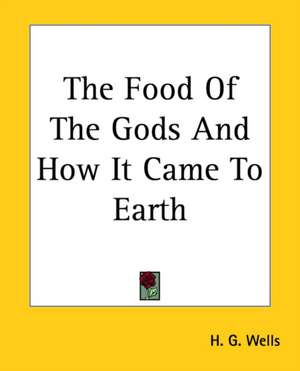The Food Of The Gods And How It Came To Earth
Autor H. G. Wellsen Limba Engleză Paperback – 17 iun 2004
| Toate formatele și edițiile | Preț | Express |
|---|---|---|
| Paperback (16) | 48.68 lei 3-5 săpt. | |
| CREATESPACE – | 48.68 lei 3-5 săpt. | |
| – | 54.63 lei 3-5 săpt. | |
| CREATESPACE – | 71.88 lei 3-5 săpt. | |
| CREATESPACE – | 80.02 lei 3-5 săpt. | |
| CreateSpace Independent Publishing Platform – | 86.01 lei 3-5 săpt. | |
| CREATESPACE – | 90.34 lei 3-5 săpt. | |
| – | 111.49 lei 3-5 săpt. | |
| – | 139.45 lei 3-5 săpt. | |
| – | 75.64 lei 6-8 săpt. | |
| – | 89.46 lei 6-8 săpt. | |
| LIGHTNING SOURCE INC – 30 ian 2006 | 97.84 lei 38-44 zile | |
| 1st World Publishing – 30 sep 2008 | 112.35 lei 6-8 săpt. | |
| Bottom of the Hill Publishing – 31 iul 2013 | 117.93 lei 6-8 săpt. | |
| CreateSpace Independent Publishing Platform – | 130.07 lei 6-8 săpt. | |
| Kessinger Publishing – 17 iun 2004 | 172.32 lei 38-44 zile | |
| LIGHTNING SOURCE INC – 27 oct 2018 | 362.90 lei 17-23 zile | |
| Hardback (1) | 200.26 lei 6-8 săpt. | |
| 1st World Publishing – 30 sep 2008 | 200.26 lei 6-8 săpt. |
Preț: 172.32 lei
Nou
Puncte Express: 258
Preț estimativ în valută:
32.98€ • 34.07$ • 27.43£
32.98€ • 34.07$ • 27.43£
Carte tipărită la comandă
Livrare economică 15-21 martie
Preluare comenzi: 021 569.72.76
Specificații
ISBN-13: 9781419162572
ISBN-10: 1419162578
Pagini: 220
Dimensiuni: 191 x 235 x 12 mm
Greutate: 0.42 kg
Editura: Kessinger Publishing
ISBN-10: 1419162578
Pagini: 220
Dimensiuni: 191 x 235 x 12 mm
Greutate: 0.42 kg
Editura: Kessinger Publishing
Notă biografică
Herbert George Wells (1866 - 1946)-known as H. G. Wells-was a prolific English writer in many genres, including the novel, history, politics and social commentary, as well as textbooks and rules for war games. Wells is now best remembered for his science fiction novels and is called the father of science fiction, along with Jules Verne and Hugo Gernsback. His most notable science fiction works include The Time Machine (1895), The Island of Doctor Moreau (1896), The Invisible Man (1897) and The War of the Worlds (1898). He was nominated for the Nobel Prize in Literature four times.
